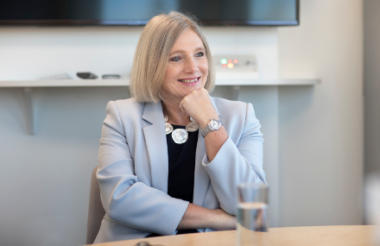The outgoing chief executive of the Charity Commission has said the “culture wars” have affected many charities “acutely”.
Speaking today at ICAEW’s annual charity conference, Helen Stephenson said one of the trends she had noticed during her tenure was an increasing “pace of change”, driven by technological developments and changing attitudes.
She said that charity leaders and professionals advising charities “are called upon to live in an ongoing attitude of learning, adapting and growing”, adding that “there’s little opportunity for us to stand still and rest on our laurels”.
Stephenson warned that “some feel left behind and indeed often devalued and ignored by those changes”.
“In my mind, the so-called culture wars are essentially different levels of comfort with the nature and pace of these changes,” she said.
“These divergences are playing out across society and they impact on many charities very acutely. In part, I think, because they’re so often fuelled by the sense of mission, a desire to right a wrong or serve a certain community, whether that be a community place or interest.
“There is no way for charities to immunise themselves against change, whether that’s technological, cultural or economic. The question is how best to respond. I believe strongly that the challenge for charities is how to retain a laser-sharp focus on your core purpose, and what you’re ultimately set up to achieve while being open and flexible about the best ways of achieving that aim.
“This challenge applies not just to charities, but to the Commission as regulator.”
Banks respond to criticism of charity services
In November, Stephenson and the chief executives of the Charity Commission for Northern Ireland and the Office of the Scottish Charity Regulator urged the UK’s main high-street banks to improve their “substandard” services for charities.
In their letter, the signatories discussed the longstanding issues faced by charities, saying that many have been experiencing “poor customer service and administrative delays”.
At today’s conference, Stephenson said some banks had responded to their letter.
“We had such an amazing response from the charity sector. We unleashed the pain that people were feeling, and I think it’s very unusual for us at the Commission to do what we did, which was to write that public letter,” she said.
“So first of all, we had an overwhelming groundswell of people telling their stories, which I think is really important. I really do want to encourage people to keep doing that and keep putting pressure onto banks and keeping that in the public realm.
“I have had responses from the banks of varying degrees of ‘yes, we are doing things’. But again, the focus still seems to be on producing guidance to help charities work with banks rather than banks changing in order to understand charities.”
Stephenson added that the Commission has “reached out to other key players in the financial regulatory world” and is looking at how change can be brought about.
“This isn’t something that’s going to perhaps be solved overnight,” she said.
“It’s something that has been taken seriously I believe by banks, but we need to keep vocalising the difficulties where they occur and bringing them into the public realm to keep ensuring that banks understand and take seriously the pressures that charities are facing.”
Charities ‘no less impactful’ than before pandemic
Stephenson said that “charities remain vital to every community and to our society as a whole”.
“For centuries, charities have saved, improved and enriched lives. Their role in our national life is truly ancient. In fact, the oldest charity on our register goes back to the sixth century, and it was a charitable school,” she said.
“And yet, if anything, the importance of charities to our collective wellbeing has only come into sharper relief over the recent years against the backdrop of a global pandemic and the cost-of-living crisis, which has put so many households under significant strain.”
She said that the Covid-19 pandemic left many charities depleted, both in terms of finances and human energy.
“I know that many charities required a superhuman effort from their staff and volunteers just to keep the show on the road. But the sector overall is no less impactful and no less relevant and vibrant than it was in January 2020 before the pandemic broke,” she said.
Stephenson is due to step down as Commission CEO this July after seven years in post.
Related articles












